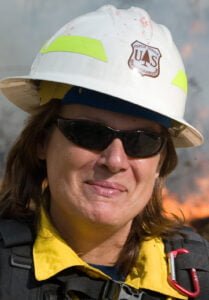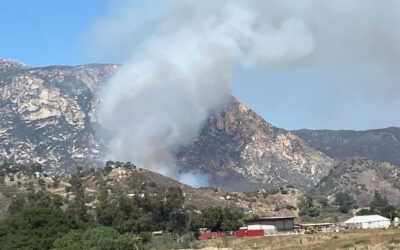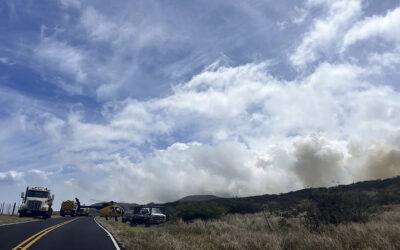Dealing With The Insanity
If you’re a federal wildland firefighter, you must feel like you’re getting whiplash from all the news coming from the politicians and bureaucrats in D.C. We were all excited awhile back when the temporary pay increase became permanent.
If you’re like me, you might have been surprised and even a bit incredulous that in this political environment we were actually successful in making those four-year-old temporary pay hikes permanent. Other gains were made, too, regarding hazard pay for prescribed burning, standby pay, and even cancer and mental health benefits.
Then the first draft presidential executive order was leaked. That one talked about combining the federal wildland fire agencies into one. But it emphasized launching airtankers on every ignition. The strategy sounded scarily like a return to the 10 a.m. policy, which began in 1935 and would be a boon to the aerial contracting industry. That draft executive order withered on the vine. Who knows what language in the draft pissed off someone in the White House or congress. It’s the magical mystery of politics.
Next came language in the big beautiful bill that was going to remove the firefighting organizations out of the five federal land management agencies and combine them into an independent agency within the Department of Interior. Again, the mystery of politics in Congress took over, and that language eventually was removed. No big beautiful federal wildland fire agency included in the big beautiful bill. Yes – no, up – down, right – left. I’m getting seasick… or just sick.
Then there was a new draft presidential executive order. This one included language again to combine the federal wildland agencies. It was all pretty vague with no real timelines or outlines of exactly how this was going to work… but hey, just do it. Sure, OK.
Throughout these starts and stops of proposals, you can imagine what all the interested parties are doing. You know the contract firefighting industry wants a piece of the pie. The airtanker industry of course want their profits too. Oh, and the bureaucrats? They’re freaking out. Any change that takes firefighters out of the USFS, BLM, NPS, FWS and BIA is giving their administrators heart failure. You can bet that those administrators are doing everything in their power to hold on to… their power.
Think about the USFS, these days. The fire budget powers most of the agency. When congress gives the USFS billions of dollars for fire management, the Washington office takes its cut for administration, human resources, computers, fleets, etc, etc. Those “overhead” charges support the agency. It happens at the regional level too.
But just as important as the money, each agency depends on those firefighters to complete project work in the field. Fire crews clearing hiking trails in the spring is not uncommon and is just one example of the benefits of having fire within a land management agency. Who will be the workforce for the district rangers when they need cheap labor?
And if those firefighters aren’t working for the local district ranger or forest, those fire engines and crews might be sent to a nearby state for a fire assignment rather than mowing the lawn at the station.
OK, so it’s clear, everyone has a dog in this fight. Contractors, from those who empty to the porta potties to those who are flying the DC-10s over your head. Let’s not forget the state foresters. Depending on the politics in their state, those folks might be neutral on the topic, but not likely. Everyone’s got an opinion on this one.
So, who did I leave out? We have the bureaucrats, contractors, and cooperators… Let’s see, who’s left? Oh yeah, YOU! The actual folks on the ground who are doing the hardest and most dangerous work. The firefighters are the only ones who don’t really have a seat at the table. The Grassroots Wildland Firefighters organization are working hard trying to represent the firefighters, but even as a retiree, I feel like life is being lived on a rubber band being stretched back and forth.
So… how are you handling all this craziness? Obviously, I’m concerned about all the to and fro. It is stressing me out. No one is asking my opinion. I think I’d feel less stressed if someone sitting at the table and speaking for all the firefighters asked my opinion. I’d at least feel like someone was curious about what someone with 45 years in the fire service thought.
But what about you? I’m sure the regional foresters aren’t asking your opinion. “Hey Engine Captain, what do you think about this?” “Hey, lead pulaski, what’s your opinion about what we should do?”
When we don’t have input into our own future, we feel helpless and out of control. And when we feel helpless and out of control, our anxiety levels go up.
You’re used to the stress of an incident. You can handle that kind of stress.
What about the political and bureaucratic stress? The kind of stress that you can’t just yell “RTO” to fix. Have you thought about how you’re communicating with your firefighters, captains, and co-workers? Everyone is feeling it.
How is the Ops Chief on the incident feeling? Could it be impacting how they’re communicating with the DIVS? And that DIVS? How are they talking to their resources?
I’m concerned about what might happen this year. Not only are IMTs going to be overworked due to a loss of team members. I’m concerned that type 3 teams are going to be forced to manage incidents that are really complex and should be managed by a complex IMT. The stress in the system is going to be dangerously high.
The stress in the system is going to be much more than just a simple PL 5 for a month. We may have PL 5, a lack of IMTs, a lack of logistical and administrative support from the agencies, bizarre politics while we worry about jobs and family.
Bad things happen when the system is stressed during a normal season. And this is much worse than a normal season. This is the time to be talking to your team and crew members, whether you’re working for the feds, a state or local agency or a contract crew.
Be aware of what kind of impact this stress can have on your health too. This is critical folks. Your health can be affected by the out-of-control conditions we find ourselves in.
Increased heart rates and breathing, stomach pains, muscle tension… it’s all quite possible while dealing with stress. And believe me, I know many of you are feeling stressed. These are the times when we get sick. And maybe even worse, our family relationships can suffer.
Keep your eye on the ball. And what’s the ball? Your safety and the safety of your coworkers is what’s most important.
When you’re home, hug your loved ones. They’ll keep you grounded. Believe me, the politicians and bureaucrats will say they care about you, too. But they’re the ones putting you through this.
As I often advise you, talk with your friends, co-workers and family. Express your fears and concerns. Make those concerns known. Talking about it will keep you less anxious and being less anxious may keep you safer. Know that this old retiree cares about you and those still doing the hard work.
Now Available
Both Sides of the Fire Line is Bobbie Scopa’s uplifting memoir of bravely facing the heat of fierce challenges, professionally and personally. It’s available now.
Order from Amazon Order from Barnes & NobleReader Feedback

 Bobbie Scopa started her career as a seasonal firefighter in 1974. After graduating from Arizona State University, she went on to work in fire and natural resource management. Eventually she left the wildand agencies to work full time for a structure fire department. She finished her Masters in Forestry at NC State then went back to the US Forest Service and BLM eventually becoming the Assistant Regional Fire Director in Region 6. Bobbie has spent many years working as a type 1 and 2 Operations Section Chief. You can listen to Bobbie tell audio stories from her long career at BobbieOnFire.com. She has also recently completed her memoir titled “Both Sides Of The Fire Line”. It will be available through Chicago Review Press late summer of 2022.
Bobbie Scopa started her career as a seasonal firefighter in 1974. After graduating from Arizona State University, she went on to work in fire and natural resource management. Eventually she left the wildand agencies to work full time for a structure fire department. She finished her Masters in Forestry at NC State then went back to the US Forest Service and BLM eventually becoming the Assistant Regional Fire Director in Region 6. Bobbie has spent many years working as a type 1 and 2 Operations Section Chief. You can listen to Bobbie tell audio stories from her long career at BobbieOnFire.com. She has also recently completed her memoir titled “Both Sides Of The Fire Line”. It will be available through Chicago Review Press late summer of 2022.


